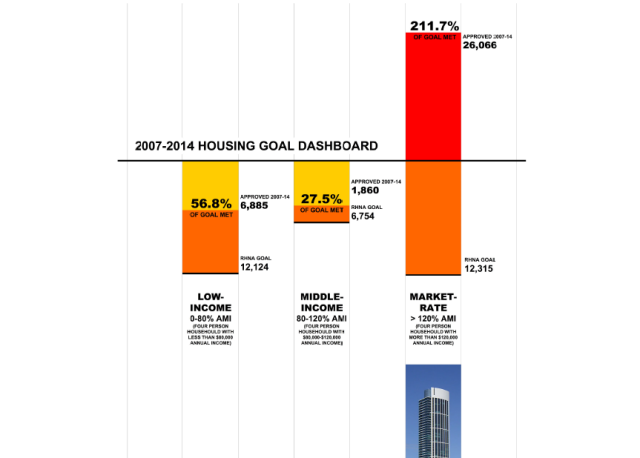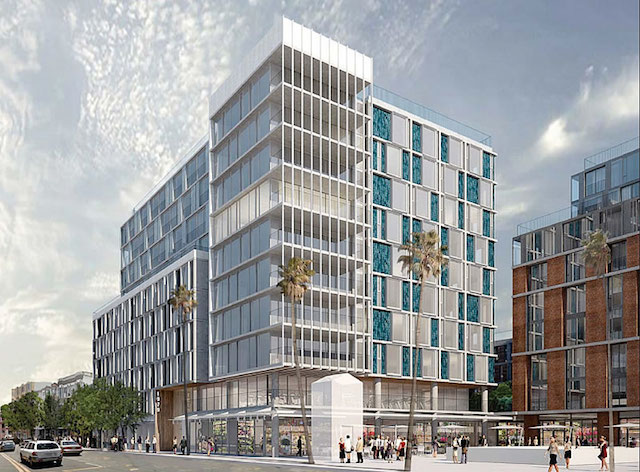Authors’ note: This opinion piece was submitted to the San Francisco Chronicle in response to the paper’s editorial on Sunday Oct 22nd titled “A clear-eyed report on the housing crisis,” but the editors would not publish our submittal. So it is provided here to allow San Francisco readers the opportunity for an alternative perspective from the Chronicle.
The San Francisco Chronicle last Sunday gave a glowing review to the Bay Area Council’s latest report on housing policy. At least the BAC was correctly characterized as “a pro-business think tank.” Though in the same breath the editors claim that the report “avoids ideological dogma.” Well, let’s dig a bit into the Bay Area Council’s analysis, then.

First, what is “the supply problem?” In the Bay Area region over the period from 2007-2014, the total permitted new housing was only 57% of the official need as identified in what’s called the “Regional Housing Needs Allocation” that is prescribed by the state of California. One might jump to the conclusion, as does the Bay Area Council, that therefore any policies to increase whatever kind of housing supply is a “solution.”
But an inconvenient truth, of many hidden in this report, is that the RHNA is broken down into categories of housing affordability, and the fact is that 99% of the market-rate housing need was permitted across the Bay Area region from 2007-2014. By contrast, only 28% of all needed below-market housing was permitted for households from the poorest to middle-income families. So, “the supply problem” is about affordable housing that the real estate market is simply not producing for the vast majority of Bay Area residents. Policies as advocated by the Bay Area Council and the development industry that simply fuel more market-rate housing in the name of solving an affordable housing deficit are misleading at best.
Second, what is “the permitting problem?” The BAC asserts that enough housing isn’t being built because cities are slow or obstructionist in issuing building permits. So, the solution they and others in the development industry have peddled is to make the approval of development “by right,” eliminating local discretion. But it is important to clearly understand, as the Bay Area Council’s “clear-eyed report” does not, that approval of a development project—what in the business is called an “entitlement” approval—does not mean that a project will actually get built.
The inconvenient truth here is that cities don’t build market-rate housing, developers and their financiers do. So, approving a development project is no assurance that the developer will actually break ground and build the project any time soon.
Real estate development is a business, like any other commodity production, and the timing of constructing a housing project is based on playing the “market-cycle” to maximize investment returns, not necessarily on the needs or timing of public policy. The result is a disconnect between the approval of housing projects (the entitlement by local governments) and their actual production.
In San Francisco, for example, there are approximately 14,000 or more units approved for construction in the “pipeline” than are actually being built, and, on average, that backlog has increased by almost 700 units every year. That’s not even counting the approved housing from the massive Park Merced, Hunters Point/Candlestick, and Treasure Island developments, already-approved units of housing for which those developers have not pulled building permits.
Help us save local journalism!
Every tax-deductible donation helps us grow to cover the issues that mean the most to our community. Become a 48 Hills Hero and support the only daily progressive news source in the Bay Area.
So, the BAC “solution” to eliminate local discretion over approving development—and in the process cutting out environmental review, community involvement and the ability to maximize public benefits from development—are traded off for total uncertainty and simply a wish that this will result in actual new units on the ground. You won’t hear the development industry advocating for a “use it or lose it” provision that requires an approved project to begin construction within a specified period of time, let’s say a generous 18 months, as that would mean they’d be on the hook to actually build housing rather than simply speculating on housing approvals.
Real solutions to the local and state affordable housing needs would start with: 1) adding real “teeth” to state Housing Element law, such as linking transportation funding to actual affordable housing permitting and construction; 2) authorizing local “inclusionary” requirements on private development to ensure lower-income and middle-income housing is produced; 3) closing loopholes in state Ellis Act to preserve existing affordable housing, and regulations on short-term rentals and second-homes that are reducing available housing supply, and; 4) creating a new permanent source of state funding for affordable low-income and middle-income housing, such as a document recording fee on real estate sales.
These are just some of the tangible policy actions that would clearly target the problem. Politically difficult, yes, given the guaranteed resistance from the “pro-business” interests who want the public to believe in their own brand of solutions. But certainly more useful than the doe-eye magical thinking that is dished up in the latest report from the Bay Area Council.





